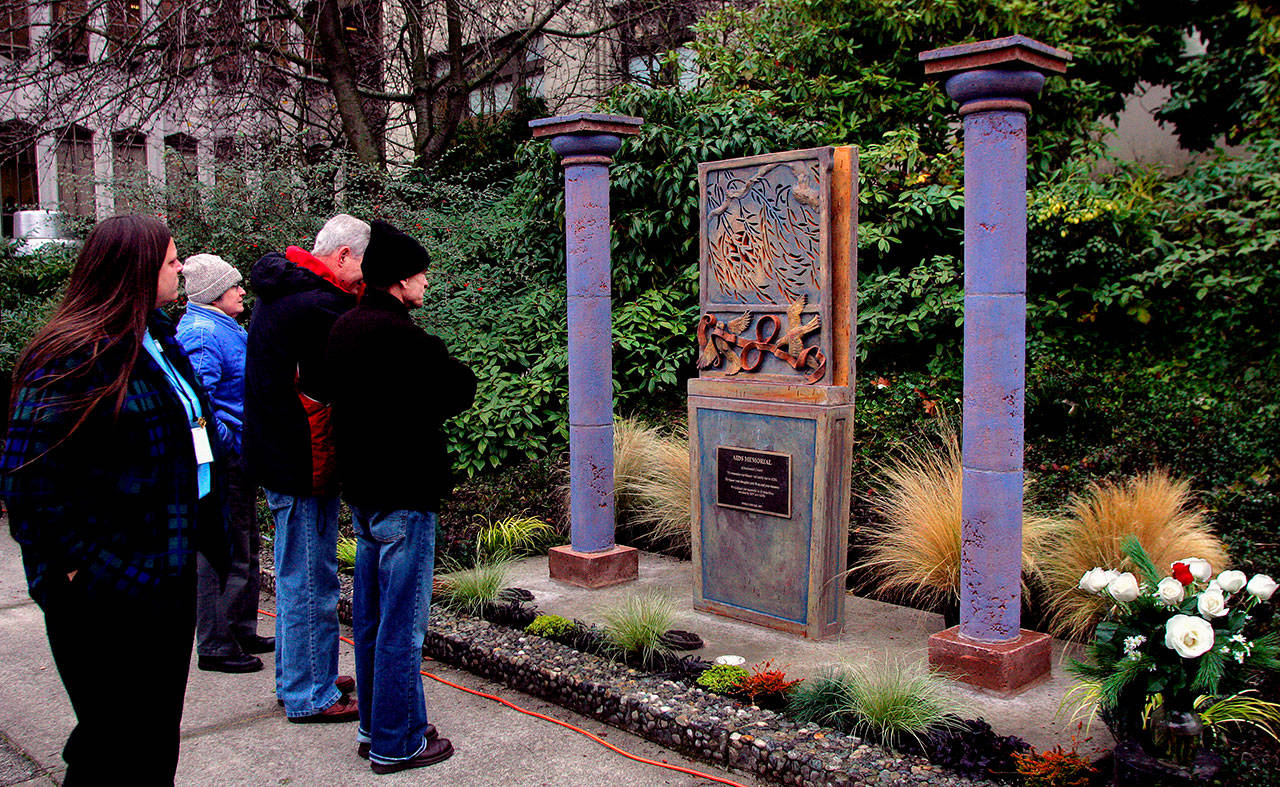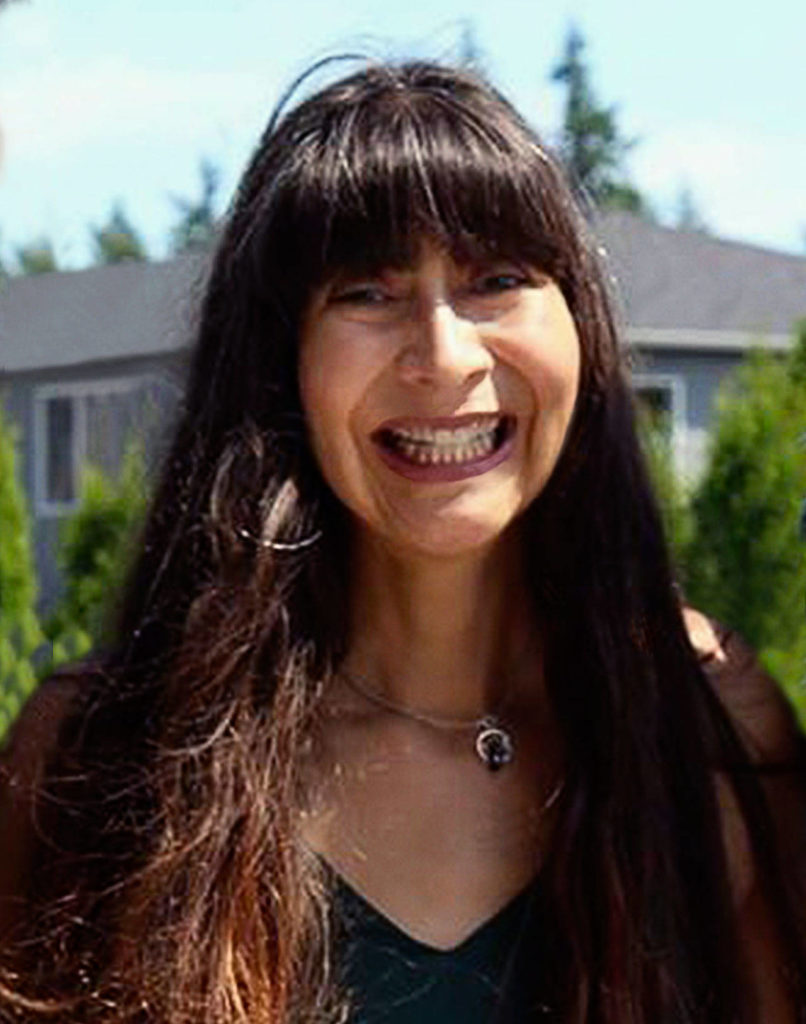At 53, Jeannine Fleming feels “blessed to be alive.” The Marysville woman has lived with HIV, the virus that causes AIDS, since 1993.
“I’m a ball of energy. I take medication every day,” she said Monday. “There’s no reason anybody on this globe should die from HIV.”
The mother of two grown sons and a social worker with the state Department of Social and Health Services, Fleming contracted the virus in Nigeria. She served with the Peace Corps in West Africa from 1991 to 1993.
She’ll be in downtown Everett Sunday as AIDS Project Snohomish County marks World AIDS Day, observed each year on Dec. 1. The nonprofit, which works to prevent HIV and help those affected by it, has scheduled the event for 2 p.m. Sunday at the AIDS Memorial, west of the Mission Building on the Snohomish County Campus.
“I will be there, me and my husband,” said Fleming, an AIDS Project Snohomish County board member who has written letters and opinion pieces published in The Herald drawing attention to HIV and AIDS.
The event is a chance to remember loved ones who have died of the disease, and to get a referral for testing.
“People don’t think about those living with HIV as much as they used to,” said Katelen Kellogg, spokeswoman for the Pride Foundation and a board member with AIDS Project Snohomish County.
Sunday’s tribute will be a time for “lifting up the stories of people who have been lost,” Kellogg said. “But it’s also to look at the current reality. It used to affect many groups. Now it disproportionately affects people of color.”
Lack of health care access is an issue, but “there are low-cost medications available,” Kellogg said. “It’s just as much about lack of public education.”
In 2018, according to the Centers for Disease Control and Prevention, 37,832 people were diagnosed with HIV in the United States and U.S. dependent areas. Overall, more than 600,000 people in the United States have died of the disease. Worldwide, there were about 38 million people with HIV/AIDS in 2018.
In Washington, an estimated 14,000 people were living with HIV by the end of 2018, according to the state Department of Health. Twenty new cases were diagnosed last year in Snohomish County.
“We keep on plugging along,” said Frank Busichio, a former manager of the Snohomish Health District’s AIDS program. He later managed health care at the Monroe Correctional Complex. Now retired, Busichio is also an AIDS Project Snohomish County board member.
Started 24 years ago, the nonprofit hosts a monthly friendship meal at an Everett church. “About 20 to 50 people come — no questions asked,” Busichio said.
There are fundraising gay-bingo events at Everett’s Carl Gipson Senior Center. The local nonprofit also gives scholarships and awards grants. One grant will help Community Health Center of Snohomish County provide dental care to people with HIV.
Fleming learned she’d been infected with the virus in December ’93. In a Herald letter to the editor some years ago, she wrote of a relationship she had with a Nigerian man, and that “as our emotional intimacy grew, my guard for the protection of self” dissipated.
In 1996, she was hospitalized at Harborview Medical Center with pneumocystis pneumonia, which affects people with conditions such as HIV/AIDS that weaken the immune system. Antiretroviral HIV drugs lessen the likelihood of getting the lung infection.
“They started me on those medications immediately,” said Fleming. “Medications are just a blessing.”
Access to help, especially in other parts of the country, is a barrier, as is the ability to take medications. “People have challenges like chemical dependency or mental illness,” Fleming said.
Fleming said her husband, Jim Fleming, and her sons are HIV negative. “I take my medication every day, and get blood work every six months,” she said. “Treatment is prevention.”
Busichio came here after working with New Jersey’s Coalition on AIDS in Passaic County in the early days of the epidemic. Snohomish County’s AIDS Memorial was the state’s first, dedicated in 2005.
In Seattle, a new AIDS Memorial Pathway is due to open next year. The plaza to be known as the AMP will cover the Capitol Hill light rail station and the north edge of Cal Anderson Park.
Busichio remembers when AIDS was called GRID — for “gay-related infectious disease.” In New Jersey, he managed a mental health program. “This guy came into our clinic, he came in a wheelchair. He said ‘They say I got GRIDs.’ We put him in our hospital,” Busichio recalled. When the man rolled out of bed, nurses wouldn’t help him — Busichio was called to lift the man back into bed. “He died that weekend,” he said.
“I got on my bandwagon and have been on it ever since,” Busichio said.
To those who’d say AIDS is a result of poor choices, Fleming counters that so, too, can be other conditions — obesity or lung cancer caused by smoking.
“We’re all human. With HIV, there’s such stigma,” Fleming said. “That should not be the case, it’s a chronic disease.”
Julie Muhlstein: 425-339-3460; jmuhlstein@heraldnet.com.
World AIDS Day event
AIDS Project Snohomish County will host a World AIDS Day event at 2 p.m. Sunday at the AIDS Memorial on the Snohomish County Campus, 3000 Rockefeller Ave., Everett. It’s just west of the Mission Building, near the corner of Wetmore and Pacific avenues. Event includes free coffee and cocoa, opportunities to remember loved ones lost, and referrals for testing. Look for the red umbrellas.
Talk to us
> Give us your news tips.
> Send us a letter to the editor.
> More Herald contact information.


























